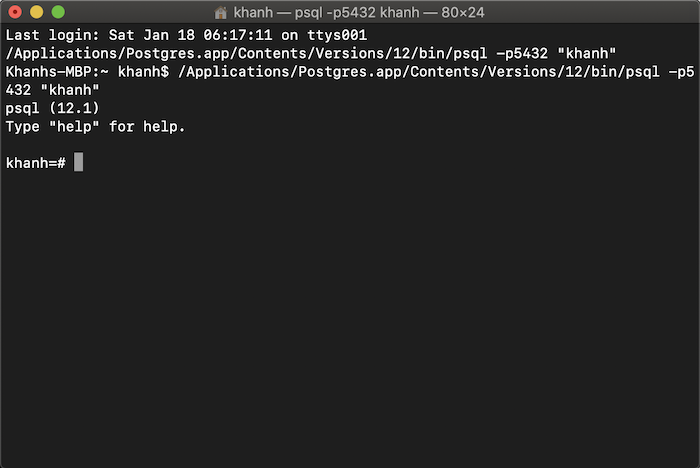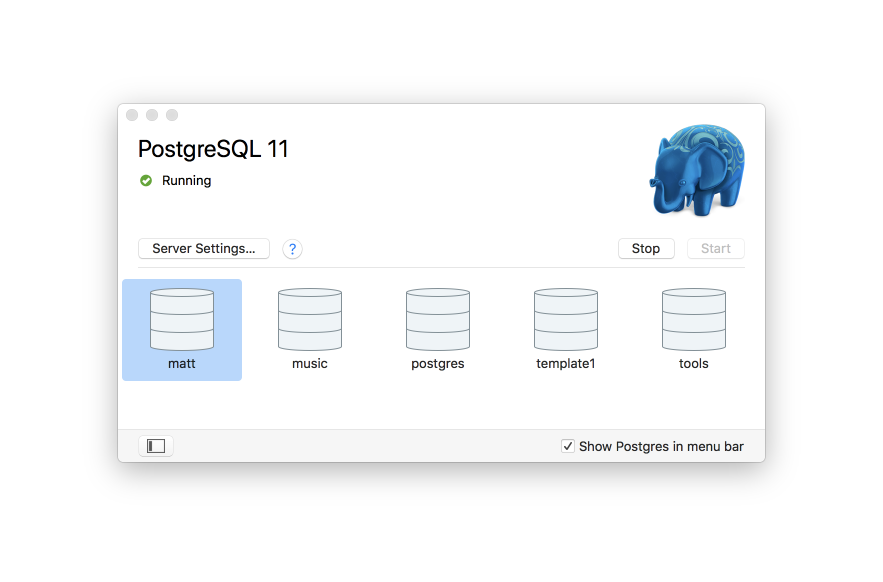

To access the Rails app from outside the cluster, we’ll define an Ingress. To access that Deployment from within the cluster we’ll define Services. We’ll define a Deployment for the Rails app. With Kubernetes, you define all these pods, and then Kubernetes’s behind-the-scenes Controller makes sure they’re up and running at all times.

A node pool is like a definition of what kind of dyno you’re up for having and how it might scale. (It contains containers – the Docker ones you’re familiar with.) A node is kind of like a Heroku dyno. To oversimplify drastically to the point of inaccuracy: A Kubernetes pod is kind of like a Heroku app, database, or other resource. These give you control over all kinds of things you didn’t have to worry about on Heroku, but the pain will be short-lived. Kubernetes lets you define cloud resources by writing YAML files.
New rails postgres app download#
This just stores a built image of your app so your Kubernetes cluster can download it to any resources it creates. You’ll have to build and push your app to a Docker container registry like Docker Hub.
New rails postgres app how to#
There are lots of tutorials on how to do this. Tl dr – our site now runs on Kubernetes and it wasn’t even that hard! (Special thanks to Scott Pruett and Xiao Shi for their help.) Prerequisites Plus, is it really overkill if it only took a few days to set up and now I can do zero-downtime deploys, scale up to the size of enormous companies, and switch vendors pretty easily if need be? The prevailing wisdom is that Kubernetes is overkill for a small Rails/Elasticsearch app, but overkill is my life philosophy. And you’re a classical singer who can’t be worrying about server uptime during concerts. You need staging/production environments and decent uptime.

You tried startup solutions like Fly and Render but encountered bugs and poor support. You don’t know much about infrastructure and don’t want to follow a 27-step AWS tutorial only to find yourself locked into one vendor. If you’re anything like me, you wrote a Rails/Postgres app (in my case a search engine for early vocal music), threw it on Heroku, and are now paying $50/mo for 1 GB of RAM while add-ons get discontinued and prices go up. You'll learn a lot about docker and docker tools.Breaking Up with Heroku: Moving a Rails/Postgres/Elasticsearch App to Kubernetes If you're fairly new to docker like me, I recommend you build your own from scratch.
New rails postgres app free#
I'm happy to get feedback on these, feel free to use them, adapt them to your needs or just take some ideas to start your own. The idea is to save time with cumbersome configurations. I'll not create templates for all possible combinations of tools but mostly for those that involve adding containers, networking, or installing other dependencies. For instance, I've currently started a new rails app with sidekiq and since I use sidekiq often, I know it's a good candidate for a template. I'll be adding more as I start new rails apps with different toolsets that might be helpful in the future. The same goes for postgres, mysql or whatever other tools you might add to these templates.

They are currently set for ruby 3 and rails 6 but the beauty of docker is that you can go ahead and easily change them to whatever version you like, without the need to have anything installed on your computer. These templates are mostly based on the official docker quickstart tutorial for rails. Using github templates I can easily create new repositories based on a chosen template, clone it to my machine, run some docker-compose commands documented in the project's README, and voilà! So, recently I've decided to put together simple docker based templates with the tools I generally work with on a rails project: Being able to start a rails project in under 5 minutes has given me back the joy of working on side projects and exploring new things. But I never found a solution for that until I started using docker. I've always wanted to find a way to start a new project on my machine, seamlessly. You know when you want to start a new app, but you end up losing too much time setting it up, and solving issues with the dependencies on your machine? And after a while, you want to start another new project, only to find yourself going through the same steps and pains, to a point where you almost lose interest?


 0 kommentar(er)
0 kommentar(er)
